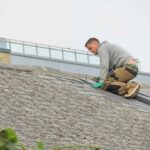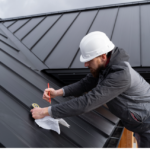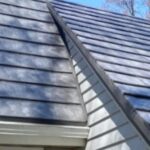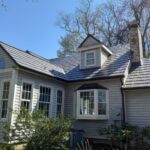Sound is No Problem With Metal Roofing
March 7, 2019 | By Mike Gonet | Filed under: Blog
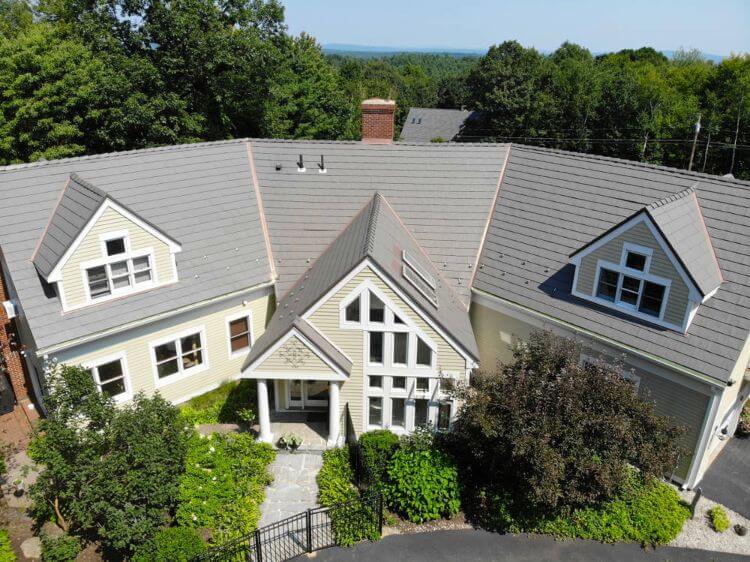
Sound Transmission Performance of Metal Roofs is Music to Homeowners’ Ears
April showers may bring spring flowers, but with the rainy season right around the corner, the question that often crops up this time of year is if metal roofs are any noisier than other types of roofs. Sound transmission is no problem with metal roofing if it is installed correctly without defects.
The Quiet Type
It’s true that the issue of noise can be a deciding factor for homeowners who are replacing a roof, and for good reason. In regions that get a lot of rain, thunder and hail storms, sound transmission is important to consider. Yet the fact is that a well-constructed metal roof simply won’t transmit any more sound than an asphalt roof.
Spring is when a lot of homeowners start planning re-roofing projects, and it also happens to be one of the rainiest seasons in many areas of the U.S. and Canada, so the issue of sound is top of mind right now,” said Renee Ramey, executive director of the Metal Roofing Alliance (MRA). “Hearing is believing, and people are often surprised to find out that metal roofs are as quiet as asphalt, even during a heavy rainstorm.”
Sound Transmission
Here’s why: For roofs, sound transmission depends not only on the roofing material, but the roof decking, insulation and installation techniques. Quality metal roofing installed over a solid substrate such as plywood or even an old asphalt roof, with proper insulation and fasteners, will greatly reduce sound. Today’s modern metal roofs also are often manufactured with formed or texturize patterns which can break up the impact of drops hitting the roof, reducing the sound. The result is a roof that is no louder than any other type.
It’s easy to understand how the myth of noisy metal roofs started. On its own, metal can make a pinging or metallic ringing noise when struck. But for roofs, the whole is greater than the sum of its parts and a quality metal roof that has been properly installed will deliver a lifetime of reliable, low maintenance and sound-reducing performance. For homeowners who actually prefer hearing rain patter falling on a rooftop, they are better off adding skylights if they want to enhance the sound effect (which is also simple to do when installing a metal roof).
A Noisy Roof is a Bad Sign
The Metal Roofing Alliance emphasizes that a noisy metal roof may be a red flag that the roof wasn’t installed according to the manufacturer’s recommendations, or that the insulation is insufficient. Too-few fasteners, fasteners that are loose or are incorrectly placed can be an issue. Roof underlayment also can make a big difference. Foam insulating panels or mats installed between the sheathing and roofing material not only can reduce sound but provide benefits such as increased efficiency and protection. The shape of roof also is a factor when it comes to sound, no matter what material is used. A roof with a higher surface and more attic space tends to be quieter than a flat roof.
Rainy Region Benefits of Metal Roofs
Metal roofs offer additional benefits for those who reside in rainy regions. Thanks to tight seam construction, protective coatings and the natural water-shedding ability of metal, properly installed metal roofs help prevent leaks and problems that can allow moisture to seep into a home’s interior. They reduce maintenance caused by moisture that plague other types of roofs, such as helping prevent the growth of moss and fungus. That makes metal a top choice for homeowners looking for maximum long-lasting performance and simple, worry-free maintenance. And for most homeowners, that’s truly music to their ears.
For more information about the benefits of metal roofing and to learn more, visit www.metalroofing.com.
For more about sound transmission or if you are having problems with a noisy roof, call us at (866) 660-6668 or use our Free Consultation form to schedule a free estimate. We have “the best roof under the sun” all of our southern New England locations in MA CT, RI, and NH. Financing is available for qualified homeowners.
